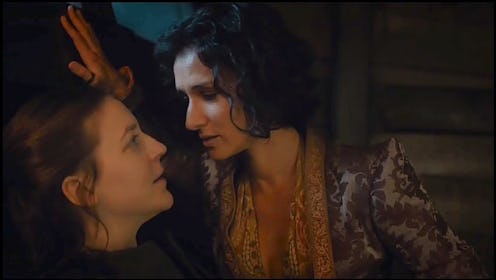Entertainment
Why Ellaria & Yara's Short-Lived Romance Is Insulting To ‘Game Of Thrones’ Fans

Game Of Thrones fans thought they had a queer couple to root for after spotting Yara Greyjoy and Ellaria Sand share a kiss in the Season 7 trailer. The fact that this much-tweeted about kiss took place in "Stormborn," the second episode of Season 7, seemed to mean that the show was going to give some real screen time to a LGBTQ+ relationship this season. Well, stop right there, because Indira Varma confirmed that Episode 3 "The Queen's Justice" was actually Ellaria's final episode. And this bait and switch feels even worse when you consider that Ellaria and Yara were never supposed to kiss at all.
Gemma Whelan, who plays Yara, told Entertainment Weekly that the kiss with Ellaria was improvised. “It wasn’t directed that we would kiss,” Whelan said. “It just seemed like something we should do... It was meant to be a suggestion [of flirting], and then it became more sexual than we expected because it seemed right."
This passionate moment was never supposed to be a plot point — and yet it was advertised as one. Shortly after the Game of Thrones Season 7 trailer revealed the kiss between Yara, who has been called GOT's first lesbian character, and the openly bisexual Ellaria, people expressed their excitement on social media. One fan tweeted "I SHIP IT." Another wrote, "YESSSS POWER QUEERS ON #GameOfThrones." And yet a third tweeted, "Guys... I just saw Ellaria Sand and Yara Greyjoy make out so I'm in for the rest of the season."
But, in light of Varma's departure, what was presumed to be a win for LGBTQ+ representation now feels rather insincere. As one fan tweeted, "Still annoyed Ellaria and Yara got interrupted by some bullsh*t. The gays can't have nice things I swear." Essentially, the kiss — both in the trailer and in the episode — seems like a way to get people talking, not a way to increase the show's diversity of sexualities.
The show's lack of diversity is something that's come under fire many times before, but it was recently back in the news thanks to John Boyega's GQ cover story. The Star Wars: The Force Awakens star told the magazine, "There are no black people on Game of Thrones. You don't see one black person in Lord of the Rings. I ain't paying money to always see one type of person on-screen." The show's casting director Nina Gold claimed to Vanity Fair last month that Game Of Thrones doesn't have a diversity problem, but the fact remains that the few actors of color that they do have on the show are in small supporting roles. (Jacob Anderson as Grey Worm and Nathalie Emmanuel as Missandei are the most noteworthy.)
And when it comes to LGBTQ+ representation, Game Of Thrones hasn't been doing better. As Vulture pointed out last year, GOT has a "gay problem" in that, yes, it has gay and bi characters — Yara, Ellaria, Renly Baratheon, Oberyn Martell, Loras Tyrell — who express their sexuality more implicitly than in George R.R. Martin's books. But most have met tragic ends. Renly was killed by Melisandre's smoke monster and Oberyn, whose bisexuality was always seen as a kink rather than legitimate, had his head crushed by the Mountain. The worst example, though, may be Ser Loras, who died in the Season 6 finale as part of Cersei's plan to take back the Iron Throne — after being forced to renounce his sexuality.
Now, Ellaria being sentenced to watch her daughter die in Cersei's dungeon, where she'll likely die herself, continues the streak of LGBTQ+ characters on Game Of Thrones becoming plot devices. Their stories never seem to be their own, but a way to push the narratives of straight characters forward. In Ellaria's case, she allows Cersei to get revenge for her daughter Myrcella, who Ellaria killed with a poisonous kiss. Her sexuality wasn't what led to her death, but Ellaria has still become the latest LGBTQ+ character on Game Of Thrones to have to die when there are so few to begin with.
This trend of killing off LGBTQ+ characters also promotes the tired "Bury Your Gays" trope, where LGBTQ+ characters just can't get a happy ending. In this case, Yara and Ellaria never had a chance to live happily ever after or at least express their feelings for more than a few seconds, because the writers didn't really even plan on putting them together — despite the kiss being featured in the trailer for the entire season.
Queer sexuality shouldn't be used by Game Of Thrones, or any show, to titillate viewers. The kind of representation TV offers is important, because studies have shown that what they see in media helps people determine what they consider normal. It isn't inclusive to have Yara and Ellaria kiss when that kiss was immediately interrupted by death and dismay, when that kiss apparently wasn't supposed to develop these characters or this relationship further.
For some, Yara and Ellaria's one romantic moment was just a kiss, but for other GoT fans it was something more. It was the promise that their love and passion and sexualities would being taken seriously — a promise that was ultimately broken.